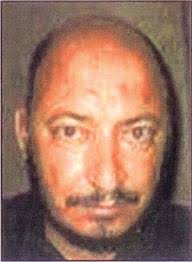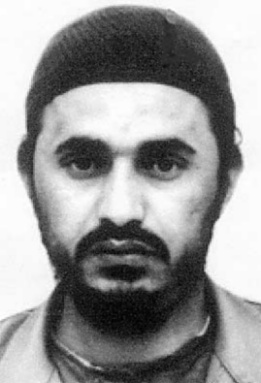Muntada al-Ansar was an Islamist forum page associated with Al-Qaeda. [1] The forum's domain was in Malaysia.
On May 11, 2004, the website of the Islamist forum Muntada al-Ansar reposted a video titled "Sheikh Abu Musab al-Zarqawi slaughters an American", [2] [3] which shows American citizen Nick Berg being decapitated. [4] [5]
The web page, on a site located in Malaysia, was then shut down a few days after by the domain provider. [6] [7]
It is unclear whether al-Zarqawi is one of the men in the video. Both al-Zarqawi and Muntada al-Ansar are associated with the Al-Qaeda movement. [8] [1]

Ansar al-Islam in Kurdistan, simply called Ansar al-Islam, is a Kurdish Islamist militant and separatist group. It was established in northern Iraq around the Kurdistan Region by Kurdish Islamists who were former Taliban and former Al-Qaeda volunteers, which were coming back from Afghanistan in 2001 after the Fall of Kabul. It was formed with the motive of establishing an Islamic state around the Kurdistan region and protecting Kurds from other armed insurgent groups during the Iraqi insurgency. It imposed strict Sharia in villages it controlled around Byara near the Iranian border.

The Canal Hotel bombing was a suicide truck bombing in Baghdad, Iraq, during the afternoon of 19 August 2003. It killed 23 people, including the United Nations' Special Representative in Iraq Sérgio Vieira de Mello, and wounded over 100, including human rights lawyer and political activist Amin Mekki Medani. The blast targeted the United Nations Assistance Mission in Iraq created just five days earlier. The 19 August bombing resulted in the withdrawal within weeks of most of the 600 UN staff members from Iraq. These events were to have a profound and lasting impact on the UN's security practices globally.

Jamaat Ansar al-Sunnah, also known as Jaish Ansar al-Sunna, Ali ibn Abi Talib Battalion or simply as Ansar al-Sunnah was an Iraqi Sunni insurgent group that fought against US troops and their local allies during the Iraq War. The group was primarily based in northern and central Iraq, and included mostly Iraqi fighters. In 2007, it split; with its Kurdish members pledging allegiance to Ansar al-Islam, and its Arab members creating a group called Ansar al-Sunnah Shariah Committee, before changing its name to Ansar al-Ahlu Sunnah in 2011.
Nicholas Evan Berg was an American freelance radio-tower repairman who went to Iraq after the United States' invasion of Iraq. He was abducted and beheaded according to a video released in May 2004 by Islamist militants in response to the Abu Ghraib torture and prisoner abuse involving the United States Army and Iraqi prisoners. The CIA claimed Berg was murdered by Abu Musab al-Zarqawi. The decapitation video was released on the internet, reportedly from London to a Malaysian-hosted homepage by the Islamist organization Jama'at al-Tawhid wal-Jihad.

Jama'at al-Tawhid wal-Jihad, abbreviated as JTJ or Jama'at, was a Salafi jihadist militant group. It was founded in Jordan in 1999, and was led by Jordanian national Abu Musab al-Zarqawi for the entirety of its existence. During the Iraqi insurgency (2003–11), the group became a decentralized network with foreign fighters with a considerable Iraqi membership.

Shosei Koda was a Japanese citizen who was kidnapped while touring Iraq and later beheaded on 29 October 2004 by Abu Musab al-Zarqawi's group, al-Qaeda in Iraq. He was the first Japanese person beheaded in Iraq.

The Saddam Hussein and al-Qaeda link allegations were based on false claims by the United States government alleging that a secretive relationship existed between Iraqi president Saddam Hussein and the Sunni pan-Islamist militant organization al-Qaeda between 1992 and 2003. U.S. president George W. Bush used it as a main reason for invading Iraq in 2003.
Al-Qal3ah, Qal3ah, or Qal3ati was an Internet forum infamous for being the site of announcements and discussions by Islamic extremists. Postings included several videos of the decapitation of hostages by Abu Musab al-Zarqawi's group in Iraq. The website had upwards of ten mirrors, but all are down as of 23 February 2007. The Islamist-extremist watchdog group Society for Internet Research claim that the forums were owned by the Muslim reformist Sa'ad Al-Faqih . On the same day as the 7 July 2005 London bombings, the Qal3ah forum carried a posting which took responsibility for those bombings. But on July 9, 2005, The Guardian reported that al-Faqih denied ownership of the site and claimed that the accusation was a "Zionist smear."
A beheading video is a video which depicts a live murder in which a hostage or victim is shown to be graphically decapitated, or the head is displayed in the aftermath. Such videos are typically distributed mostly through the Internet, and are often employed by groups seeking to instill shock or terror into a population. Although beheading has been a widely employed public execution method since the ancient Greeks and Romans, videos of this type only began to arise in 2002 with the beheading of Daniel Pearl and the growth of the Internet in the Information Age, which allowed groups to anonymously publish these videos for public consumption. The beheadings shown in these videos are usually not performed in a "classical" method — decapitating a victim quickly with a blow from a sword or axe — but by the relatively slow and torturous process of slicing and sawing the victim's neck, while still alive, with a knife.

The Mujahideen Shura Council, was an umbrella organization of at least six Sunni Islamist insurgent groups taking part in the Iraqi insurgency against U.S.-led Coalition and Iraqi forces. The groups included in the MSC were: Tanzim Qaidat al-Jihad fi Bilad al-Rafidayn, Jaish al-Ta'ifa al-Mansurah, Katbiyan Ansar Al-Tawhid wal Sunnah, Saraya al-Jihad Group, al-Ghuraba Brigades, and al-Ahwal Brigades. In mid-October 2006, a statement was released, stating that the Mujahideen Shura Council had been disbanded, and was replaced by the Islamic State of Iraq.
Younes Tsouli is a Moroccan-born resident of the United Kingdom who, in 2007, was found guilty of incitement to commit acts of terrorism and sentenced to 16 years in prison. His crimes were carried out via the internet, where he was known by several pseudonyms based on variations of Irhabi 007; "Irhabi" being the Arabic word for "terrorist", and "007" a reference to the fictional British secret agent, James Bond.

Abu Ayyub al-Masri, also known as Abu Hamza al-Muhajir, born Abdel Moneim Ezz El-Din Ali Al-Badawi, was an Egyptian militant leader who was the leader of Al-Qaeda in Iraq during the Iraqi insurgency, following the death of Abu Musab al-Zarqawi in June 2006. He was war minister of the Islamic State of Iraq from 2006 to 2010 and prime minister of the Islamic State of Iraq from 2009 to 2010. He was killed during a raid on his safehouse on 18 April 2010.
This article is a chronological listing of allegations of meetings between members of al-Qaeda and members of Saddam Hussein's government, as well as other information relevant to conspiracy theories involving Saddam Hussein and al-Qaeda.

Abu Omar al-Baghdadi, born Hamid Dawud Mohamed Khalil al-Zawi was an Iraqi militant who was the Emir of the Islamic militant umbrella organization Mujahideen Shura Council (MSC), and its successor, the Islamic State of Iraq (ISI), which fought against the U.S.-led Coalition forces during the Iraqi insurgency.
Abu Qaswarah al-Maghribi was a Moroccan national who was reportedly the No. 2 leader of Al-Qaeda in Iraq and the senior leader in Northern Iraq. He died in a building in Mosul during a shootout with American troops.

Abu Musab al-Zarqawi, born Ahmad Fadeel al-Nazal al-Khalayleh, was a Jordanian militant jihadist who ran a training camp in Afghanistan. He became known after going to Iraq and being responsible for a series of bombings, beheadings, and attacks during the Iraq War, reportedly "turning an insurgency against US troops" in Iraq "into a Shia–Sunni civil war". He was sometimes known by his supporters as the "Sheikh of the slaughterers".

It is believed that members of Al-Qaeda are hiding along the border of Afghanistan and northwest sections of Pakistan. In Iraq, elements loosely associated with al-Qaeda, in the Jama'at al-Tawhid wal-Jihad organization commanded by Abu Musab al-Zarqawi, have played a key role in the War in Iraq.
Shadi Abdalla is as an associate of Abu Musab al Zarqawi, the leader of al Qaeda in Iraq, and as having knowledge of some of al Qaeda's most important Afghan training camps.

The Pankisi Gorge crisis was a spillover of the Second Chechen War, with military dimension in Georgia early in the 2000s. Georgia was pressured by Russia and the United States to repress the threats of Al-Qaeda in the Pankisi Gorge.

Abd al-Rahman Mustafa al-Qaduli, better known as Abu Ali al-Anbari, was the governor for territories held by the Islamic State of Iraq and the Levant (ISIL) in Syria. Considered the ISIL second-in-command, he was viewed as a potential successor of ISIL leader Abu Bakr al-Baghdadi.